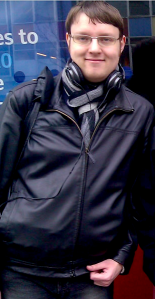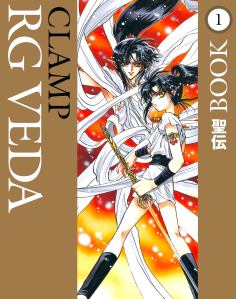

Ian Wolf is a man with a plan
I am posting this on April Fool’s Day. But it is after midday, so all that follows is true. And today is also CLAMP Day.
Next year, on 1st April 2022, it may be CLAMP Day 2… or it may not be. It is complicated.
A few days ago, I got an email from Ian Wolf. Although that might not be his name. It is complicated. The email was headed:
Autistic author releasing CLAMP book a-chapter-per-year for free until he finds publisher.
During the UK’s multiple COVID-19 lockdowns over the last 12 months, Ian Wolf decided to keep himself occupied by writing CLAMPdown – a humorous book about his favourite comic book artists – the all-women Japanese manga group CLAMP.
CLAMP is a group of four women who have been creating manga since the 1980s. The group consists of writer Nanase Ohkawa, artists Mokona Apapa (aka Mokona) and Mick Nekoi (aka Tsubaki Nekoi) and designer and art assistant Satsuki Igarashi.

CLAMP in 2006 (Photo by John (Phoenix) Brown)
Their subjects range from Hindu mythology (RG Veda), ‘magical girl’ kids romance (Cardcaptor Sakura), the apocalypse (X), social commentary (Tokyo Babylon) and fantasy worlds where everything is named after a car (Magic Knight Rayearth) to lesbian sex comedy (Miyuki-chan in Wonderland).
Frankly, in my view, you just can’t beat a good lesbian sex comedy.
Author Ian Wolf works for the British Comedy Guide website. He is their ‘Data Specialist’:
“I write up articles for several shows,” he explains, “creating feature articles, reporting news stories, maintaining the TV and radio schedule and so forth. Probably my most famous work is collecting the reviews for all the shows during the Edinburgh Fringe. In 2015, I was given the first and only ‘Unsung Hero’ Award at the Ham Fist Prizes for my work. In 2019, I became a judge for the Increasingly Prestigious Malcolm Hardee Awards.”
He also worked as an editor for the television website On The Box, having previously been a TV and radio reviewer for Giggle Beats.

Ian tries panda-ing to Eastern tastes
In early 2020, Ian also became a question writer for a couple of UK peaktime TV quiz shows Richard Osman’s House of Games and The Wall, under his real name (Ian Dunn).
He has also twice been a contestant on Mastermind – His specialist subjects were the BBC Radio 4 sitcom Bleak Expectations and the Four Gospels.
He tells me: “I also wrote in the preface to CLAMPdown that I was a Countdown conundrum setter – but this is a mountweasel. I put in as a trap to make sure journalists are paying attention, as I later mention in the introduction that this is one show I did not work on.”
Ian is from Stockton-on-Tees and has a mild form of Asperger’s Syndrome, part of the autistic spectrum.
Parallel to comedy, quizzes, Radio 4’s Bleak Expectations and entrapping unwary journalists, another area of interest for Ian is anime and manga.

Ian as seen in Anime form…
“I wrote a Beginner’s Guide to Anime for On The Box,” he explains, “and I review it for the website Anime UK News.
He was also the manga critic for all 71 issues of MyM Magazine” (2012-18)
I said to Ian: “Just for my blog’s reader in Guatemala, explain the difference between anime and manga…”
“Anime is animation from Japan. Manga is comic books from Japan.”
He has struggled to find a publisher for CLAMPdown partly, he thinks, because of his Asperger’s Syndrome and the niche subject of his book.
He says: “Having written a comic book (‘comic’ as in ‘funny’) about comic books (‘comic’ as in ‘graphic novel’), I have decided to go about it in a comic (‘funny’) way and so, having set up the Twitter account @clampdownbook, I want to make the publishers come to me, by publishing free entire extracts of CLAMPdown for all to read.”
Chapter 1: From Gay Guys to Genderless Gods covers the origins of CLAMP and their first commercially published work RG Veda, a series loosely based on the Vedic text the Rig Veda and focuses on Ashura, a genderless god of destruction.

RG Veda, a series loosely based on the Vedic text
Ian says: “I am publishing one chapter of the book online, for free, until a publisher picks it up or the entire book is available for free. If I find no company willing to publish the book within a year, then I will publish Chapter 2 the same time next year.”
If a publisher is still not found, he will then publish a new chapter every year until a publisher does appear or the entire book is available for free online. As it stands, he says, “this would end in 2038, but it could become longer if CLAMP create any new works during that time.
“Of course, I want a publisher to take an immediate interest in my work and offer me the chance to release CLAMPdown now for anyone to buy. However, if no publisher is currently interested, I’m happy to play the long game. Plus, I feel I can deal with rejection better if it is told to me gently over roughly two decades rather than straight away.”
As well as manga comics, CLAMP’s work extends into anime TV series. The group have provided character designs for the forthcoming TV anime series Cardfight!! Vanguard overdress, which debuts on Saturday (3rd April).
One of CLAMP’s older titles, occult detective series Tokyo Babylon, was the subject of a planned TV adaptation entitled Tokyo Babylon 2021, but production was cancelled on Monday after production company GoHands reportedly committed multiple acts of plagiarism. There are plans to restart afresh.
“What is your favourite anime TV series?” I asked Ian.
“The sci-fi comedy Gurren Lagann. Think Carry On Pacific Rim – big giant robots, and at one point a woman’s bikini flies off Barbara Windsor style.”
“I will keep that image of an anime bikini flying off into the air in my mind for some considerable time,” I told him.
“In anime and manga,” Ian emphasised to me, “there is something for everyone.”

